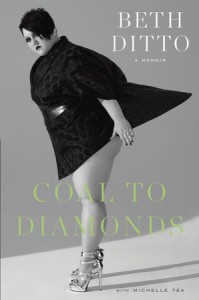 Coal to Diamonds
Coal to Diamonds
by Beth Ditto with Michelle Tea
Spiegel and Grau. 176 pages, $22.
GHOST-WRITTEN AUTOBIOGRAPHIES of current celebrities and tell-all biographies by “friends” have long been popular, even if the information in them is suspect. It’s not clear if this book belongs in one of these categories, because it’s not clear how much was written by Michelle Tea, an award-winning chronicler of working-class lesbian life, and how much really comes from the mouth of Beth Ditto, lead singer of the punk band Gossip.
The book is a first-person narrative in the straightforward language of a girl from rural Arkansas who escaped a traditional fate of lifelong poverty and oppression by following her dream. Her story will seem familiar to anyone who has read about the rags-to-riches lives of popular music stars in the tradition of Elvis Presley, Dolly Parton, Johnny Cash, and Loretta Lynn. Even the title of this book seems to echo the title of Coal Miner’s Daughter, Loretta Lynn’s 1980 biopic, filmed before Beth Ditto was born.
Despite the clichés in the writing, this life story contains digressions from a well-worn path. Beth Ditto credits the Riot Grrl movement of the 1990s, not Jesus or a loving family, with saving her life. She identifies herself as a fat-positive femme lesbian, and her discussion of her upbringing makes it clear that sexual abuse (especially of girls) is not an individual misfortune but a feature of down-home American culture. Beth describes her own mother Velmyra at age twelve, “sitting in a courtroom as a judge decided whether or not her father had raped her.” This information is not a revelation about an unusually dysfunctional family. As the author explains, “In a place where so many men were abusive, the whole system operated to deny the existence of abuse, to make it normal, unpunishable.” The judge decided that Velmyra was lying. Punk music from urban centers in the Northwest is described as a rebellious shout from the outside world that inspired young Beth to resist the social pressure to fall into a traditional feminine life of childbearing, shame, and silence. Punk became the soundtrack that she lived by in the 1990s. In high school, she found a few like-minded friends, and singing became her way of asserting herself: “Jennifer and I would stay up late singing Counting Crows songs into a tape recorder and making up our own songs too. I loved to sing, I loved to take the thoughts in my mind and braid them into a melody.” Eventually, Beth and the other members of her fledgling band escaped from small-town Arkansas by moving to Washington state. They began acquiring a cult following in the local music scene, but performing remained largely a labor of love for them. As though the struggle for survival were not enough, Beth began experiencing strange medical symptoms: she became thinner than ever before while losing her sight. Then she had trouble swallowing and noticed that her voice was changing. Having no medical insurance, she delayed getting a diagnosis, and when she did, the news was worse than she suspected: she had a rare autoimmune disorder called sarcoidosis, in which the body attacks itself. Steroids enabled her to function more-or-less normally, but no one could promise her a cure. After being hospitalized for depression, Beth apparently made decisions which led to several much-needed breaks. She and the remaining members of her band moved to a larger city, Portland, Oregon, and went on tour with a better-known band, Le Tigre, which raised their visibility. At last they were able to live on the proceeds of their music instead of juggling gigs with low-paid service jobs. The message with which Beth Ditto (speaking with or through Michelle Tea) concludes her life-story is simple but profound: “Take your [own]inspiration and let it lead you out into the world, into your big amazing genius life. Voices in your head, echoes of people trying to hold you down—tell them to fuck off. You’re perfect the way you are. You don’t need to change anything but the world, so get to it.” This advice has been given by various iconoclasts in various eras, and it coincides with the words of earlier feminists. As discouraging as it is to learn that a woman artist born in 1981 faced essentially the same obstacles to self-determination that Virginia Woolf described in 1929 in A Room of One’s Own, it is always encouraging to read about individuals who learn to survive on their own terms and to tell the truth about their experience. Of course, much of the message of salvation through music is in the beat. Whether or not this book records Beth Ditto’s voice in an accurate way, her performances and recordings certainly do. Jean Roberta is a writer based in Regina, Saskatchewan.
________________________________________________________




